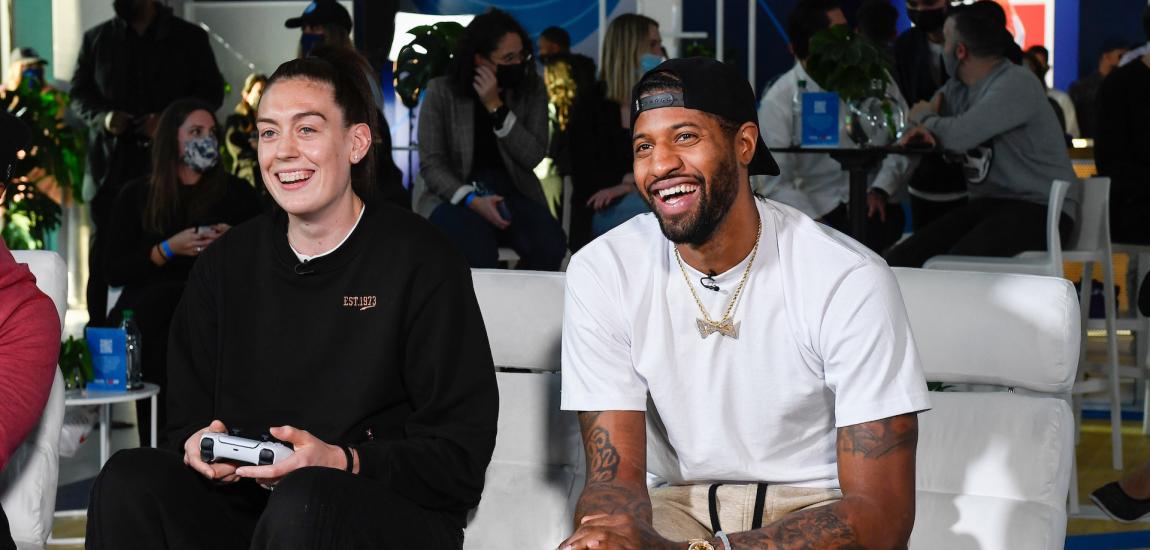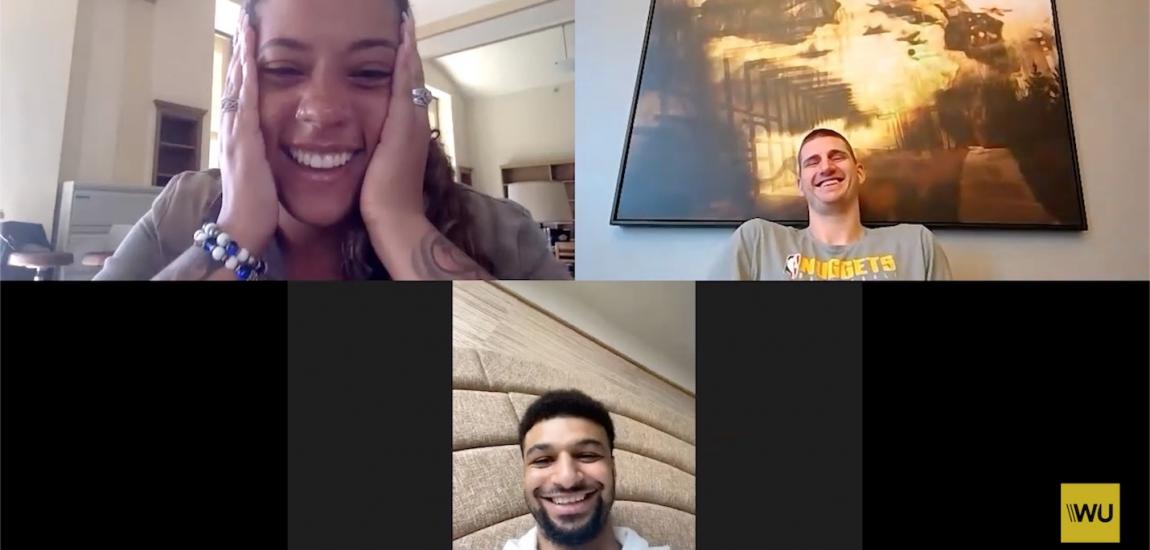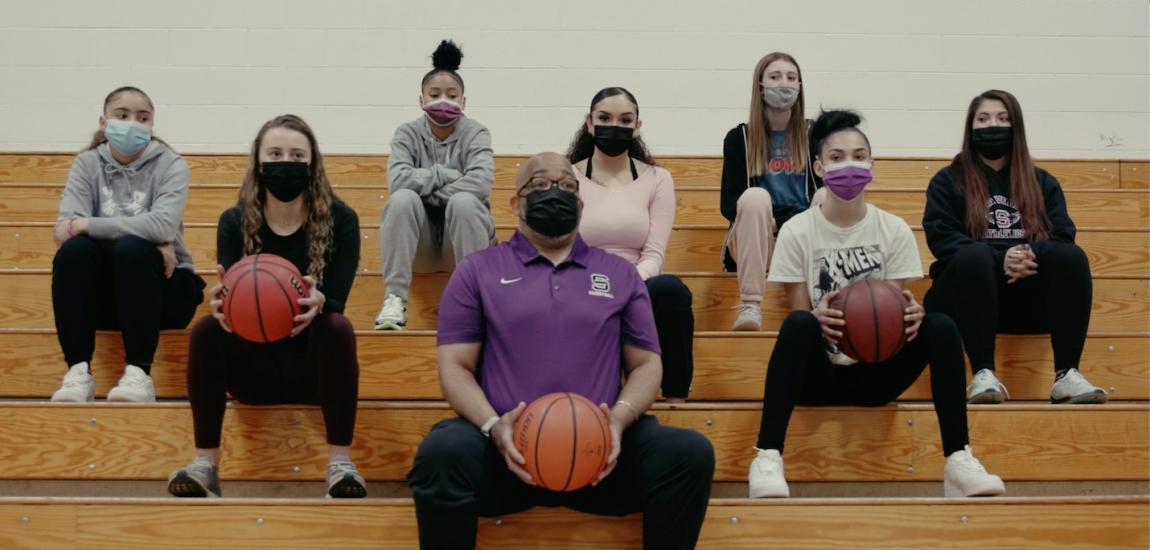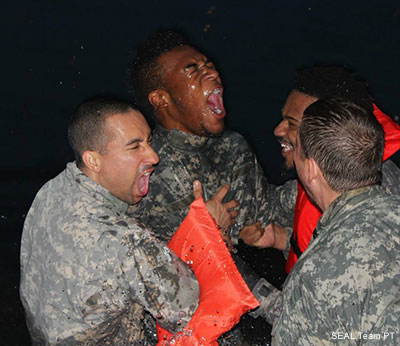
It's 5:45 in the morning at Belle Isle in Richmond, Virginia.
"Hooyah!" John McGuire yells.
"Hooyah!" yells back a gathering of people shrouded in the pre-dawn fog, eager and ready to go.
After a quick warm-up, teams form and scatter to their boats in the James River. For the next hour McGuire and his team of instructors lead activities and exercises designed to make getting and staying in shape fun.
"The more you keep fitness fun, the more likely you are to stick with it," says McGuire, who spent 10 years working as a Navy SEAL. "Have you ever heard of people doing push-ups on a kayak in the middle of a river early in the morning?"
On many mornings, those having this kind of fun with McGuire are doctors, lawyers, teachers and community leaders. They clean off their unrecognizably muddy faces, wring out their wet, stained clothes, get in their cars and drive away so tired they can barely sit upright -- then do it again the next day.
But during some parts of the year, this is the type of training that has helped the Virginia Commonwealth basketball team earn five consecutive NCAA tournament appearances, including a Final Four berth in 2011.
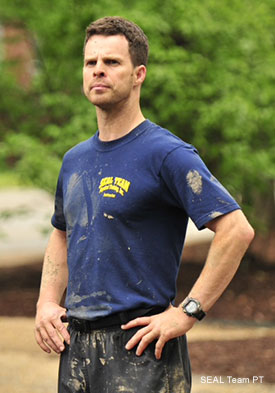
"Instructor McGuire has the unbelievable feel for what it takes to put a team together," VCU coach Shaka Smart says. "I thought it was great fun for our team. A lot of stuff that is directly related to basketball."
Before each of the past four years, McGuire spends a week with the Rams, and then makes follow-up visits during the season. His intense team-building exercises are designed to help them think and react like a team, rather than a group of individuals. Whether it's rowing boats across the James River, doing push-ups on the sandy shore or completing point-to-point missions, the goal is the same: It's to push everyone to maximize physical and mental abilities under pressure and exhaustion.
McGuire's success with teams such as VCU and Illinois has helped boost his national profile. His business, SEAL Team Physical Training, Inc., is thriving, and he has made guest appearances on CNN for his expertise on being a Navy SEAL.
His story is all the more remarkable, considering how unlikely it was that he became a SEAL in the first place.
When John McGuire was 5, his mother put him in the family car, drove him into downtown Richmond and left him on a street corner with nothing. In and out of foster care, McGuire attended nine different elementary schools. In the seventh grade, McGuire wanted to be a fighter pilot. In high school, he wanted to become Top Gun.
"It was right when the movie came out," McGuire says. "Those guys were the best, and I wanted to be the best. I wanted to be cool."
McGuire was studying martial arts at the time, and he still remembers the advice he heard from his sensei: "If you become a pilot and they take your plane away, you're no good. But if you become a Green Beret, you are a weapon."
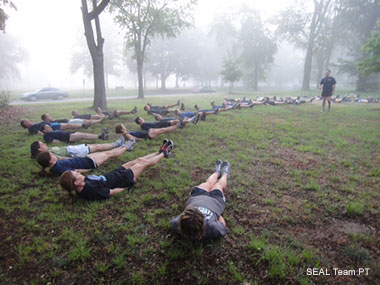
But McGuire still wanted to fly. When a friend gave him a copy of the Navy SEAL issue of Gung Ho magazine, McGuire took it to his sensei, and asked him what do you think about Navy SEALS? "I'll never forget his response," he says. "He told me that they were a bunch crazy m------, and that there was no way I could make it. I decided right then, that's what I wanted to be."
After high school graduation (which only happened, McGuire says, because schools were tired of dealing with him), he told a Navy recruiter that he wanted to be a SEAL. The recruiter said he was too small to qualify. McGuire would not take no for an answer. The recruiter ultimately caved, and off McGuire went to Florida for Navy Boot Camp and volunteered for Navy SEAL training.
The first day they were told to swim 500 yards and they had to use either breast stroke or side stroke. While waiting in the water before the start, McGuire turned to the guy beside him and said, "Hey, buddy, what's a breast stroke?" As it turns out, McGuire, who was about to embark on one of the most intense -- water centric -- training programs in the world, didn't know how to breast stroke or side stroke.
"All I could ever do is walk down the diving board on my hands, flip into the water and make it over to the side of the pool," he says. "We were kids. We liked to show off."
McGuire spent countless hours in the pool to become one of the strongest and fastest swimmers in his class. The survivor who'd been essentially figuring things out on his own since he was 5 not only learned how to swim, but he ultimately became a member of one of the most elite military programs in the world, the Navy SEALs.
In 1998, after ten years of serving his country all over the world, and cataloguing experiences too clandestine to discuss, McGuire needed to focus on his family life. "I'd be gone up to 11 months at a time," he says. "I remember coming home one day after being gone and my 5-year-old daughter ran away from me and hid, because she was scared of this stranger in her house."
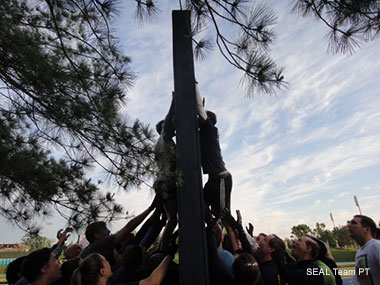
To devote the time and attention to his family that he wanted and needed, McGuire left the military. Needing work to support his family, McGuire got a job at a temp agency, and also did odd jobs such as shoveling snow, mowing lawns and raking leaves. "I go from counter drug missions in South America, to temping behind a desk," he says. "it was a real culture shock."
While at the temp agency, McGuire was left with mostly empty time on his hands. But born of this boredom came a concept that has changed the lives of countless people and boosted athletic programs all over the country: His SEAL Team Physical Training business. It has expanded beyond Richmond to Charlottesville, Washington, D.C. and Philadelphia. Miami is next. The founding principle was simple.
"It takes Everyone to win, One person to mess it up, and if someone is confused, Help them out, E1H," McGuire says. "There really is nothing like teamwork to bring out the best in people."
Developing the business however, was anything but simple. "I thought I was going to get 750 members in the first three months, but it took me almost 15 years to reach that many members," he says.
Although McGuire has successfully prepared young men and women for careers in special ops, he is always quick to say that he is not training people to become Navy SEALS. "You have to join the U.S. Navy for that," he says.
He is teaching people to believe in themselves, and know that "we can do more than we think." The principles of teamwork, leadership, communication and confidence apply to being a Navy SEAL, running a fitness company, team building and motivational speaking. McGuire and his team of expert instructors apply their teachings in all of these settings.
By October 2006, the business had grown from less than 15 members to nearly a thousand, and he was a mainstay in his five children's lives. Life for McGuire was perfect.
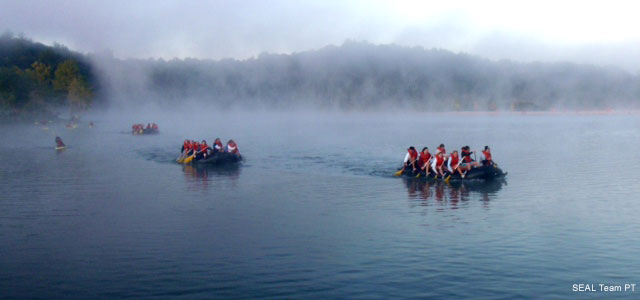
Then while doing back flips on the family trampoline, he landed awkwardly and broke the C-4 vertebrae in his neck. He was paralyzed instantly.
"It seemed like forever that I was lying there, and I couldn't move," he says.
McGuire was swiftly taken to MCV hospital in Richmond, where he was told he was not likely to make it through the night and that if he did, he would never use his arms and legs again.
That night, as he lay in bed, McGuire reflected back on his SEAL training, and decided then and there that he would not only survive the night, but that he'd be doing more pushups than anyone within two weeks. The next day he had surgery to fuse his neck, and a few short weeks later he felt movement in his fingers.
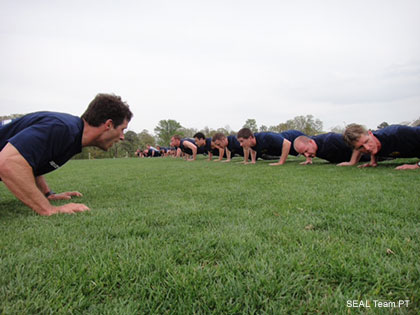
As McGuire began the long road toward recovery, the doctors were amazed by his progress. Each day he would endure formal physical therapy, but there was so much more. Rather than following doctor's orders to rest afterwards, he stayed awake all night trying to move his toes, or his fingers, or whatever else the doctors thought he would never be able to do. A month and a half after breaking his neck, McGuire was released from the hospital.
"They gave me this fancy, expensive wheelchair to take home," he says. "I told them to donate it to charity," he said. "I just couldn't see myself in a wheelchair, and I wasn't going to use it."
For the next three months, McGuire crawled around his home on his belly, until he was finally strong enough to crawl on his hands and knees. A few months later, he began walking on his own. All told, it took McGuire about 12 months to walk somewhat normally.
Since breaking his neck, McGuire can no longer do the 20 one finger pull-ups he once did daily. He can no longer swim more than ten miles in open water like he once could, and he can no longer do flips off the diving board to impress his friends. But none of that matters more than what he can do: Inspire and lead others.
When McGuire is asked to talk about his positive impact on those who experience his teaching, he is quick to deflect to those who he works and trains with.
"It's not about me, it's about them," he says. "Once when a woman told me how positive of an influence I had been on her children, I looked at her with a smile and said, 'I just do push-ups, ma'am.'"
As a result of his successful role with VCU's basketball team, McGuire and his team now train several of the school's varsity teams, among 10 other colleges. Gallaudet University, a school for the deaf and hard of hearing, had its best record in baseball in more than 25 years after its coach, Curtis Pride, asked McGuire for help.
"John's training taught me a lot and I learned more about each player and how they respond to different degrees of challenges," Pride says.
But McGuire's most fulfilling projects might be the ones who face the longest road. Chris Crawley was one of those people who signed up to train at 5:45 in the morning along the river. In December 2012, he was 27, and he weighed 350 pounds. He wasn't sure if he'd make it to 30. He couldn't run 20 feet without losing his breath, and he couldn't do a single sit-up. Chris heard about SEAL Team PT through friends and decided to give it a try.
Two years later, Crawley has lost more than 80 pounds, has run his first 10k and completed a half-marathon. One of McGuire's many sayings is "If you'll cheat yourself, who won't you cheat?" That has particular meaning for Crawley.
"I personally lack the self-motivation when left to my own devices," he says. With SEAL Team PT, "if you miss more than a day or two, suddenly people start to check in. We hold each other accountable."
"If I waited until I was in better shape to join SEAL Team PT, I'd have died before ever getting the chance."
-- Follow Rob Sievers on Twitter @SportsEsquire or email him at sportsesquire@gmail.com.

